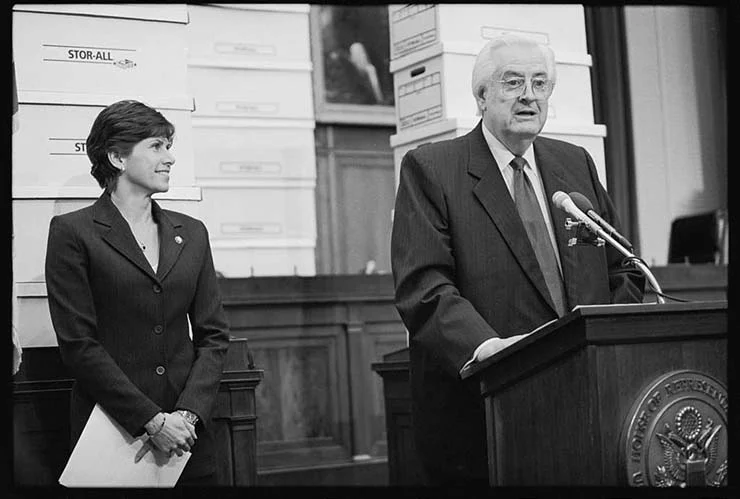“Petty.” “Divisive.” “Regrettable.” Those are words used across the political spectrum to describe the Feb. 11 decision to remove the late congressman Henry Hyde’s name from the Judicial Office Facility in Wheaton, Illinois and to cancel a planned monument in honor of the solon from suburban Chicago. Those are also words no one ever would have applied to Hyde himself. Hyde manifested the very best of American politics, in stark contrast to DuPage County Board Chairwoman Deborah Conroy and nine of her colleagues, who have plumbed new depths in the toxic cesspool that passes for government in the “Land of Lincoln.”
Best known for his 16 terms in the U.S. House of Representatives, Hyde did not discover his true vocation until middle age. It was only after helping Georgetown University’s basketball team reach the NCAA championship game, serving in the U.S. Navy during World War II, spending decades in Chicago’s Naval Intelligence Reserve unit achieving the rank of commander, entertaining audiences as a stand-up comedian, and advocating for clients as a successful lawyer and for constituents as a state legislator that Hyde found his vocation as a congressman. There Hyde earned the respect and admiration of his Democratic and Republican colleagues alike for his exceptional wisdom, wit, intelligence, rhetorical skill, generosity, and gallantry.
While Hyde’s familiar greeting to visitors, “Welcome to DuPage County, the garden spot of the galaxy,” betrayed a devotion to his district, he never neglected the national interest or the good of humanity . Much of his time during his final years in Congress was spent helping turn the tide against AIDS in Africa as chairman of what was then known as the House International Relations Committee. For his cumulative body of work, Hyde was awarded the Presidential Medal of Freedom, our nation’s highest civilian honor. He was also knighted by the pope.
Unlike so many of today’s politicians, Hyde did not run for office to play pundit on cable television or social media. He ran to achieve great things on behalf of the people. His crowning achievement came before his freshman term in Congress ended. It was the bipartisan amendment, bearing his name, barring the use of federal taxpayer funds for elective abortions. Annually renewed as part of the appropriations process, the Hyde Amendment has saved 2.5 million lives since 1976, according to a recent study by the Charlotte Lozier Institute.
Why was Hyde’s name scraped off a courthouse? “It’s strictly because of the Hyde Amendment and it’s very difficult for so many women to walk into the courthouse and see [Hyde’s name],” said Conroy. Really? Recent polling shows that 57 percent of Americans oppose taxpayer-funded abortion, including 54 percent of women. Traditionally, the Hyde Amendment has enjoyed broad bipartisan support in Congress. It was supported by Illinoisans as diverse as Ronald Reagan and Barack Obama. Under Conroy’s logic, anything in the state named after those two presidents should also be renamed.
But logic is not Conroy’s strong suit. Nor can it be found among the growing number of Democratic officeholders who, to their eternal discredit, simultaneously claim that abortion is a personal choice and demand that other people pay for it. To counter such incoherence, Rep. Christopher Smith (R-N.J.) has introduced legislation to codify the Hyde Amendment, thereby obviating the need for its annual reauthorization.
Over 1,000 mourners attended Hyde’s funeral in 2007. Among the dozens of members of Congress in attendance were then-Speaker of the House Nancy Pelosi (D-Calif.) and her successor Rep. John Boehner (R-Ohio). Of his late colleague, Boehner said “From the streets of his hometown here in Illinois to the halls of Congress, his words and deeds will echo for decades to come.” Since most legislators are forgotten after their terms in office, the decision by Conroy and company to remove Hyde’s name from a public building nearly two decades after his death is a perverse tribute to Hyde’s legacy. And as disrespectful to his memory and deleterious to political comity as this action might be, the truth is Henry Hyde does not need any more monuments. He already has 2.5 million of them.

Leave a Reply to Michael Kaiser Cancel Reply